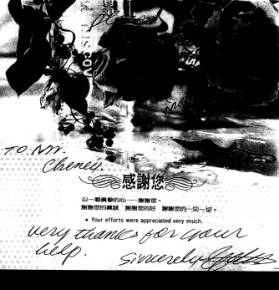Dear
Mr. Vice President Richard B. Cheney, It was truly ironic that the US
lost its seat in the UN High Commission for Human Rights, while nations with poor human
rights records such as Libya and Sudan were elected members. There are certainly many reasons
for the voting of the US out of the international body, but there is one
in particular that we must keep in mind. China
has long propagated false reasoning on human rights issues and befriended
other countries with poor rights records to form an "Anti-US
front." Even some Western countries have been seduced. The
crisis has been exposed in recent years by the fact that proposals to
condemn China's human rights violations have failed to pass in the UN High
Commission for Human Rights, but the US was not sufficiently alert to the
problem. Now UN Secretary-General Kofi
Annan has almost become China's spokesperson. Action suppressing Taiwan,
Tibet and the Falun Gong sects can be undertaken through the Secretariat.
China used to view Juan Antonio Samaranch, president of the International
Olympic Committee, as an enemy. But now he has turned out to be China's
intimate comrade-in-arms. After all, the Beijing government controls all of
China's resources, and its use of those resources is not monitored by
anyone. This is why China has gained so many friends. Despite shelving Mao Zedong's slogan of a "world
revolution," China did not forget its ambition to change the world.
It tried more actively to realize the ambition, especially after the
Tiananmen Square massacre on June 4, 1989. While China has muttered sweet
words to the US, Jiang has kept fanning the Chinese people's hatred toward
the international powers led by the US. But former US president Bill
Clinton failed to see the situation for what it was. His advisers -- maybe
they were naive or simply motivated by profit -- regarded China as a
strategic partner. As a result, the US has had to pay a price in security. This time, the vote in the UN High Commission for Human Rights has been a wake-up call for the US government. Despite the bad outcome, it may turn out to be a good thing in the long term. It may generate a sense of crisis in the US, causing it to revise its polices. It is to be hoped that the US will never again confuse friends with foes. May
15, 2001 --- Chen, who is featured on this
week's Asian edition of Time, is shown cuddling a large-sized A-Bian doll
next to a headline which blares "No Joke." In the interview Time asks Chen
what he would say to China's president Jiang Zemin if he visited Taiwan.
Chen's answer was simple and direct. "We would want Jiang to understand that Taiwan
is a true democracy and that our legislature, media and society are
democratic and diverse," Chen said. "We hope Jiang would
understand that the 'one country, two systems' policy they advocate has no
market in Taiwan." In addition to touching on
democracy and the "one country two systems" -- Chen also talked
about religious freedom, an idea China is still struggling to understand. "We would make Jiang understand that Taiwan
practices true religious freedom. While in China the Falun Gong movement
has become a problem, in Taiwan it poses no problem whatsoever." When asked if he thought his
upcoming stayovers in the US were unnecessarily provocative, Chen told the
magazine that the "US
is a sovereign and independent country … Why should they have to consult
with anyone else?" In Taiwan side, that soft and
softer again and again would may soften Beijing's anger. Despite three days later President
Bush said "my administration strongly support the 'one China' policy
…" President Bush said, "the United States is
prepared to do whatever it takes to defend Taiwan, if it is attacked by
China." This is a very strong statement that upholds the spirit of
the Taiwan relations Act. We thought that statement makes
Beijing chill out. The "one China" issue,
and how each country deals with it is very complex. The first part of the
issue is the rhetoric: the Chinese believe they will be saying their
misguided friends in Taiwan from nationalism and capitalism. Taiwanese
believe they will eventually save the Chinese from communism. Americans
believe the western brand of capitalism is the best form of freedom for
everybody, but in general we Americans have a very low understanding of
the incredible persistence So, Taiwan always needs your help.
Yours Sincerely,
|

